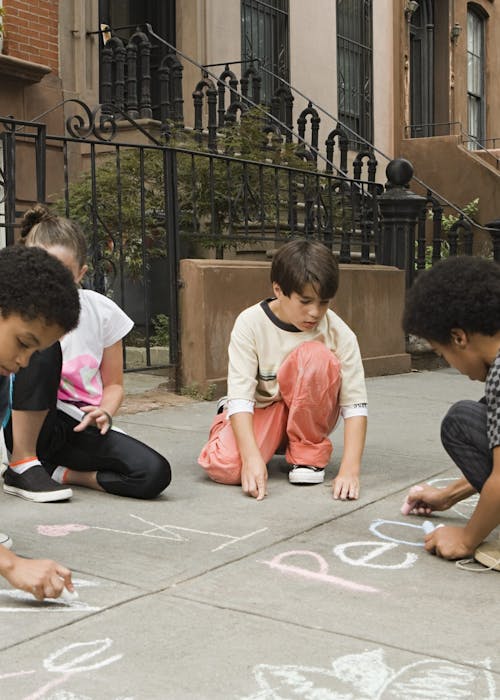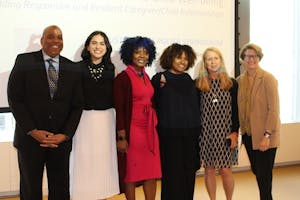

Polier Symposium 2018: Reflections on Family-Centered Approaches to Child Well-being
Insights
May 16, 2018

CCC gathered with over 100 partners in government, nonprofit and philanthropy on May 9th for its biennial symposium in honor of Justine Wise Polier, one of CCC’s founders and the first woman Justice in New York State. The event celebrated Judge Polier’s legacy of addressing the socioemotional needs of families and paid tribute to the rehabilitative models of justice, child welfare prevention and mental health services she pioneered for children and families.
The event was an opportunity to learn more about programs in New York City that take a family-centered approach to child welfare, juvenile justice and community-based services. Research in child development highlights the effectiveness of programs that help parents identify, understand and address the needs of their children (i.e. responsive parent-child relationships). Responsive parent-child relationships can foster learning, health and well-being for children, as well as the ability to respond to stressors as they grow.
“Parents are children’s first teachers, and a strong, responsive caregiver/child relationship can help create a foundation for stability and long-term well-being,” said Jennifer March, CCC’s Executive Director. “Through CCC’s participatory research in communities such as Brownsville in Brooklyn, the North Shore of Staten Island, and in Northern Manhattan, parents and young people have expressed a desire for supports that help them build more responsive relationships in households with young children as well as with older youth.”
Guests at the symposium had the opportunity to learn more about the different approaches to engaging families in parent-centered practices and what the programs view as success in their interventions.
“Success looks like parents reporting that they feel more bonded, more attached to their child, that they’re taking care of themselves more,” said Rebecca Gerstein, Henry Street Settlement’s Parent Center program coordinator. The Parent Center provides caregivers with free workshops and programs designed to build nurturing family relations, develop young-child socialization and sensory-motor skills, and connect parents to peer supports. “Success also looks like people telling us that they’re integrating our effective discipline techniques with their children, and that they feel a sense of community at the Parent Center.”
“We recognize that fathers come into our programs because of choices they’ve made, and we help them choose to make better choices based off their new perspective and a new way of making choices,” said Derek Carter, Program Director at Forestdale’s Strong Father program, which helps non-custodial fathers to provide emotional and financial support of their families through job training and placement, parent coaching, anger management counseling, and other services. “We also encourage co-parenting because we recognize that even though the father may not be able to maintain a relationship with the child’s mother, they have to co-parent in a way that the child will be nurtured and have stability.”
Marie Dunn discussed the ways in which the Family Success Initiative at Graham Windham – which links parents whose children have come into foster care to a Family Coach to help them navigate the system, build social supports, and develop parenting skills and child development knowledge – has adapted to help parents overcome barriers and reduce stressors. “Because we understand the family dynamics and the various roles (that parents play in their children’s well-being), we have a housing specialist, an educational department, and our peer network which creates that community of support for families. Some of our parents also come to us with unmet mental health issues, so we’re also training our staff now to become mental health advocates, to really address the needs of our population.”
Erasma Monticciolo described how Power of Two, a program that provides parent coaching using the Attachment and Biobehavioral Catch-Up (ABC) method, uses data to evaluate their success in helping parents develop the tools they need to break through toxic stress and foster a strong and healthy attachment with their children. “We administer the ASQ, (the Ages and Stages Questionnaire) which measures children’s socio-emotional well-being as reported by the parents, giving us rich data about how the parent is seeing the behavior of their child. We also administer a pre- and post-play assessment where we observe how the parent is interacting with the child during play. And what we found after analyzing all of our data is that for the families for whom we have pre- and post-data, 60% of the children that started at high-risk for social and emotional problems, were shifted to low risk by the end of our one-hour sessions over the course of ten weeks. And that’s incredible!”
This discussion was particularly timely as new state and local efforts could incentivize and strengthen collaborations within the field that align and increase access to supports for families.
Dr. Sylvia Rowland, senior vice president of evidence-based programs at New York Foundling, spoke about Families Rising, an alternative to incarceration program that is responsible for bringing more than 350 felony offending youths out of Riker’s Island. Dr. Rowland agrees that the first 1,000 days initiative could be a pivotal advocacy opportunity for those focused on early child well-being to achieve long-term positive outcomes. She said, “the first 1,000 days of Medicaid is the first three years of a kid’s life, and it gives you such a window on either universal or selected interventions to prevent all the things that we know about kids on Riker’s Island.” She also emphasized how the initiative presents new opportunities to expand on the potential of family-based treatment. “A parent’s diagnosis can be enough to bring the entire family to treatment. So you don’t need to wait for the kid to have a diagnosis, which is what we currently do, but the parent’s diagnosis will do that as well, which I think is just an amazing opportunity.”
CCC is grateful to our partners at Forestdale, Henry Street Settlement, New York Foundling, Power of Two, and Graham Windham for sharing their insights and bringing a nuanced understanding of parent and family-centered programs in New York City. We will continue to monitor child and family well-being initiatives underway at the state and city levels for opportunities to bring more parent-centered programs to families across the five boroughs and boost our capacity in New York City to create a foundation for improved health, mobility and well-being for all children.



